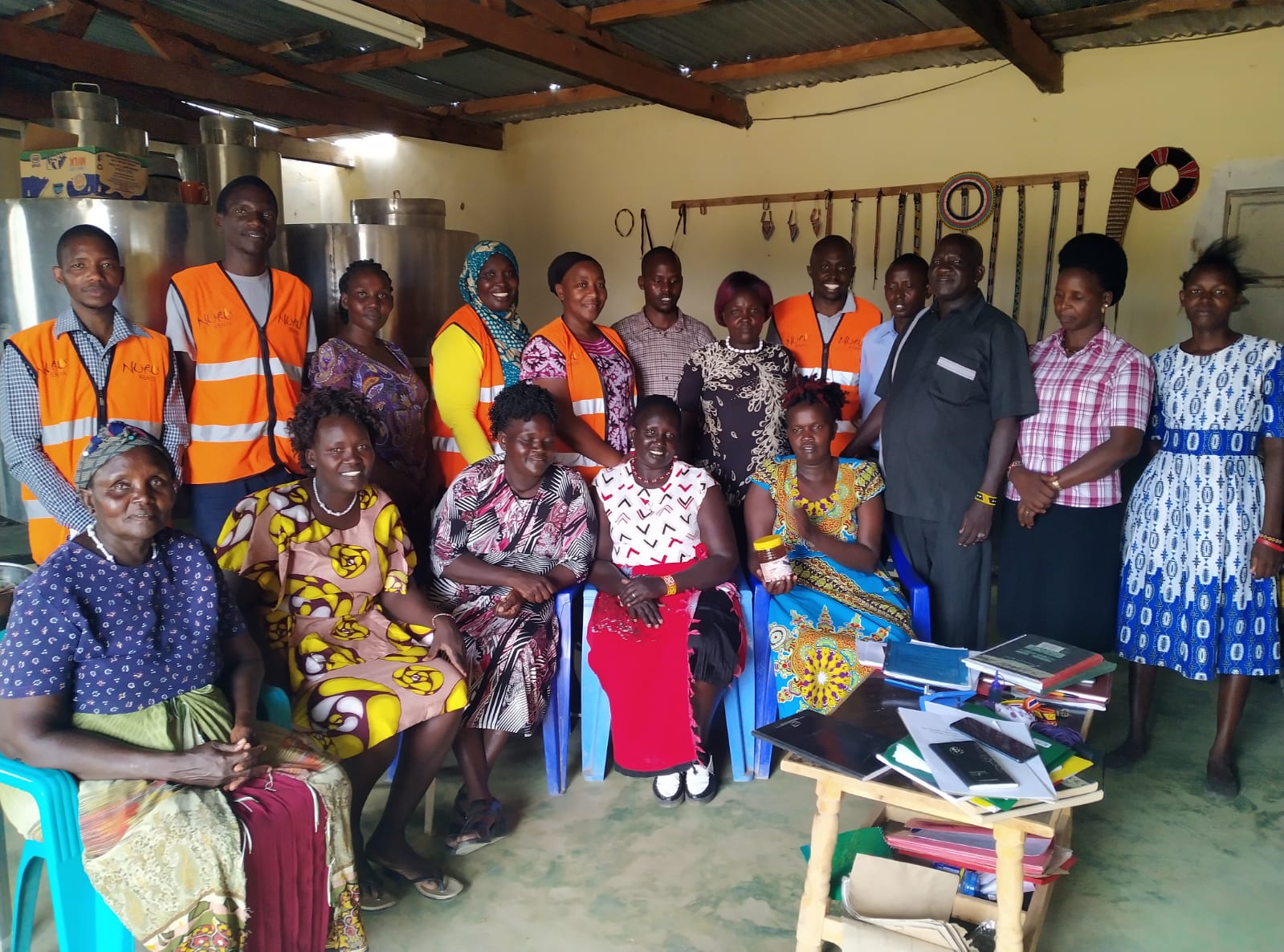Since its establishment in 2008, Nuru Kenya has now reached over 127,000 people with resources to overcome extreme poverty. Building on these years of success, Nuru Kenya is making strides with farmers in a third county: Baringo County.
The Beginning: Migori and Homa Bay Counties
Migori County, Kenya, is home to the first farmers reached by Nuru Kenya. Here, Nuru Kenya launched programs to address extreme poverty through rural livelihoods. Under the leadership of Pauline Wambeti, Nuru Kenya has equipped rural entrepreneurs in Migori County to increase their income, increase their crop yields, and build sustainable agribusinesses. After years of learning lessons and equipping rural entrepreneurs with resources through farmer-owned and farmer-led agribusinesses, Nuru Kenya expanded its services into a second county, Homa Bay.
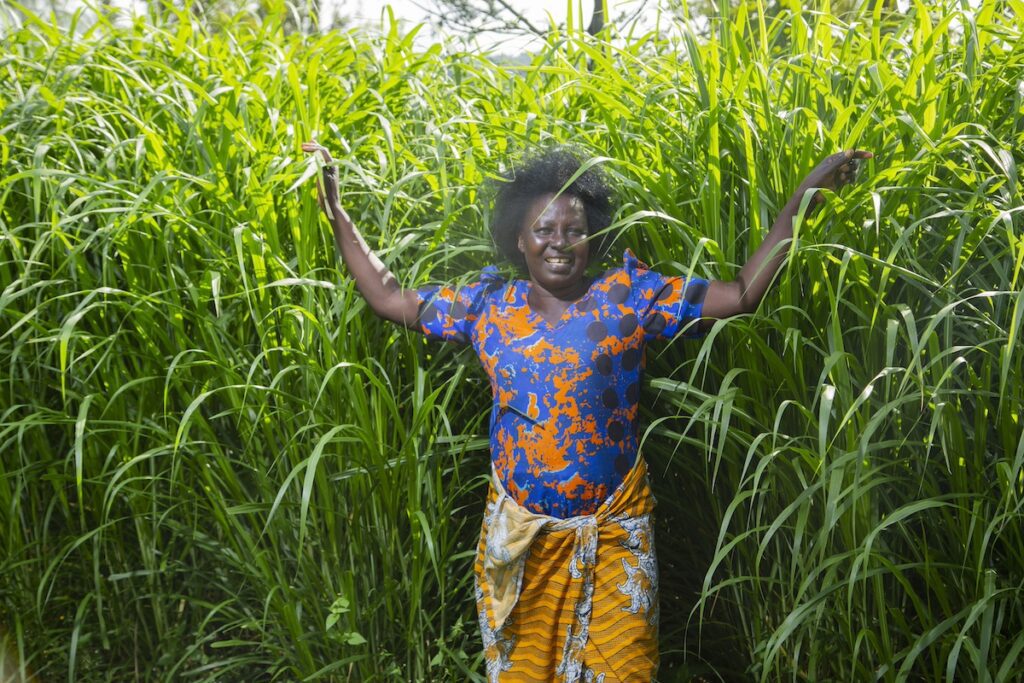
Migori County, woman farmer, 2023
Nuru Kenya has equipped marginalized, rural communities to build their own prosperity through agribusinesses that support their farmer members, support local food systems, and provide economic benefits to their local communities. Today, Nuru Kenya has strengthened the capacities of 29 farmer-owned agribusinesses in Migori and Homa Bay Counties. Through initial investments and years of Nuru Kenya-facilitated training, these agribusinesses and the communities they impact are ready to continue thriving sustainably.
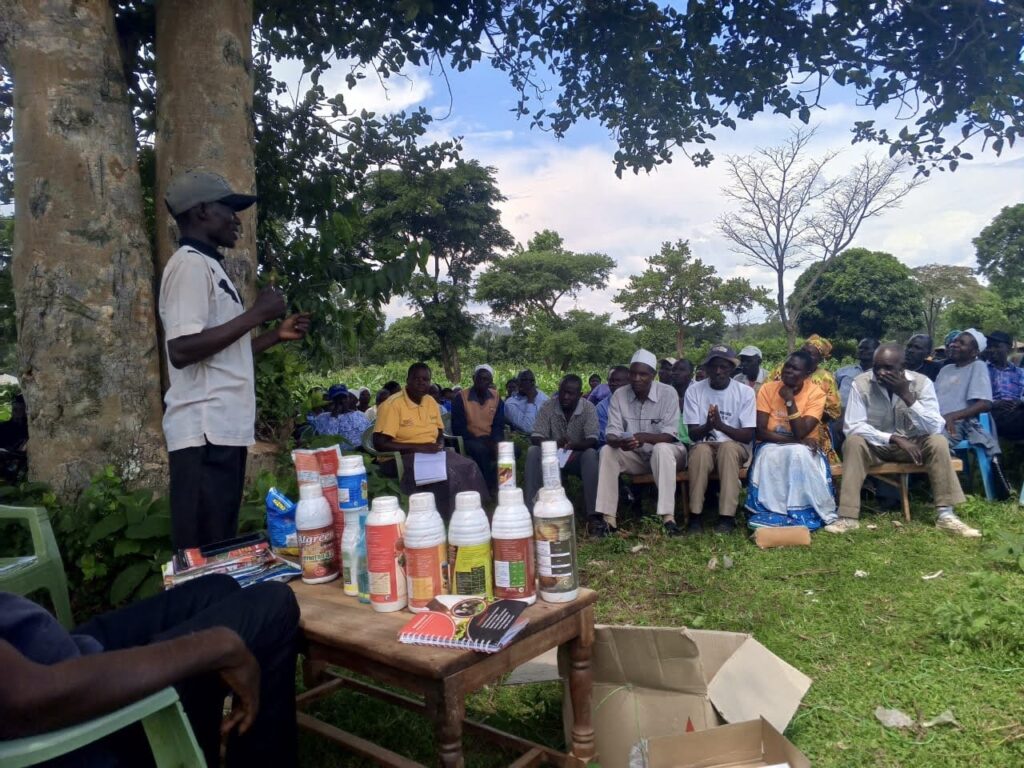
Cooperative meeting with a supplier, Homa Bay County, 2024
Baringo County: An Isolated County
Baringo County, Kenya, faces some of the highest rates of poverty seen across Kenya, with 47.5% of the population of Baringo County living on less than about $1.20 per day (2021 Kenya Poverty Report). Residents of the greater area of Baringo County have limited access to resources and livelihood diversification opportunities, as Baringo County is home to 860,000 people spread across 11,000 square kilometers of wide-ranging valleys, mountaintops and varying climatic conditions. The geographically remote and climate-impacted sub-counties where Nuru Kenya is beginning to operate require 150 to 200 kilometers of travel along a winding mixture of unpaved and paved roads to reach Kenya’s fourth largest urban center, Nakuru, and 120 to 150 kilometers to Eldoret City. The communities have limited access to reliable extension services and lack the necessary support to better negotiate access to finance or source affordable inputs. The isolated nature of these communities in Baringo County means that opportunities to diversify livelihoods are quite limited, and when farmers are able to produce a decent harvest, they struggle to access markets.
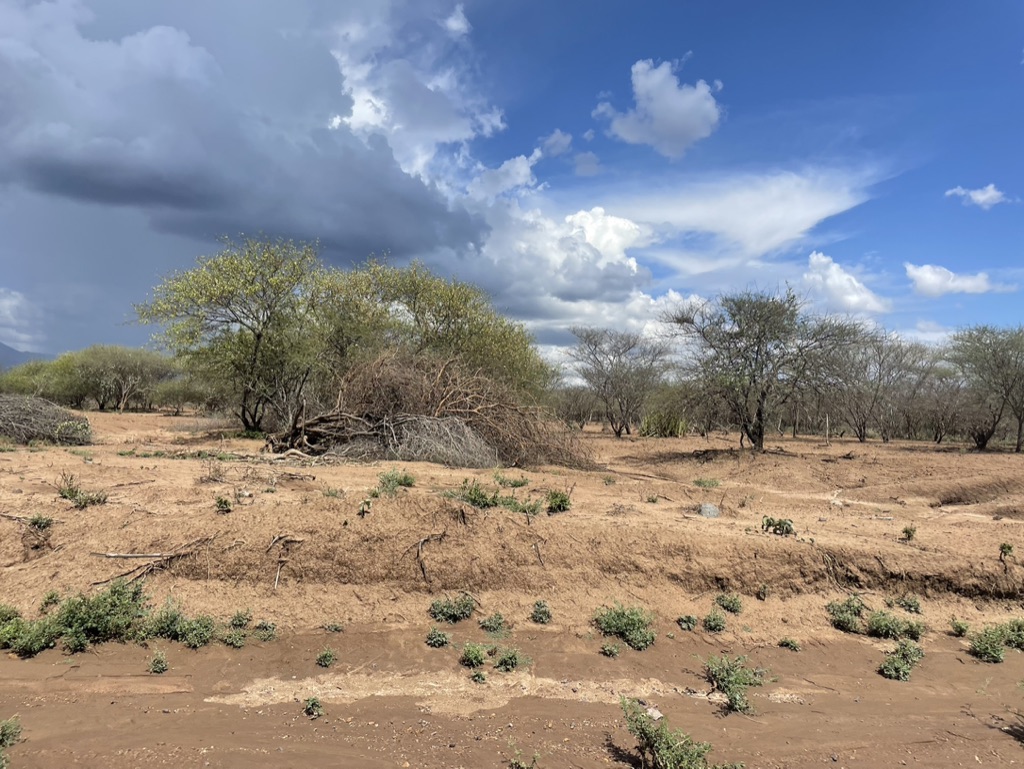
Baringo County, 2023
Climate Change and Conflict in Baringo County
The county is further challenged by the impacts of climate change, as Baringo County is classified as arid and semi-arid land (ASAL). It is highly susceptible to extreme weather events, like droughts and floods, that devastate livestock and human health. Smallholder farmers in Baringo County are relying on rain-fed agriculture and routinely finding their lives upended by pests, droughts, floods, and unforeseen financial shocks created by the effects of climate change. In just the last week, Baringo County has been inundated with heavy rainfall and flooding that has impacted both crop yields and the ability of people to travel into and out of the area (FEWS). These detrimental effects on farmer households and natural resources have accelerated regional instability and stoked inter-ethnic tensions.
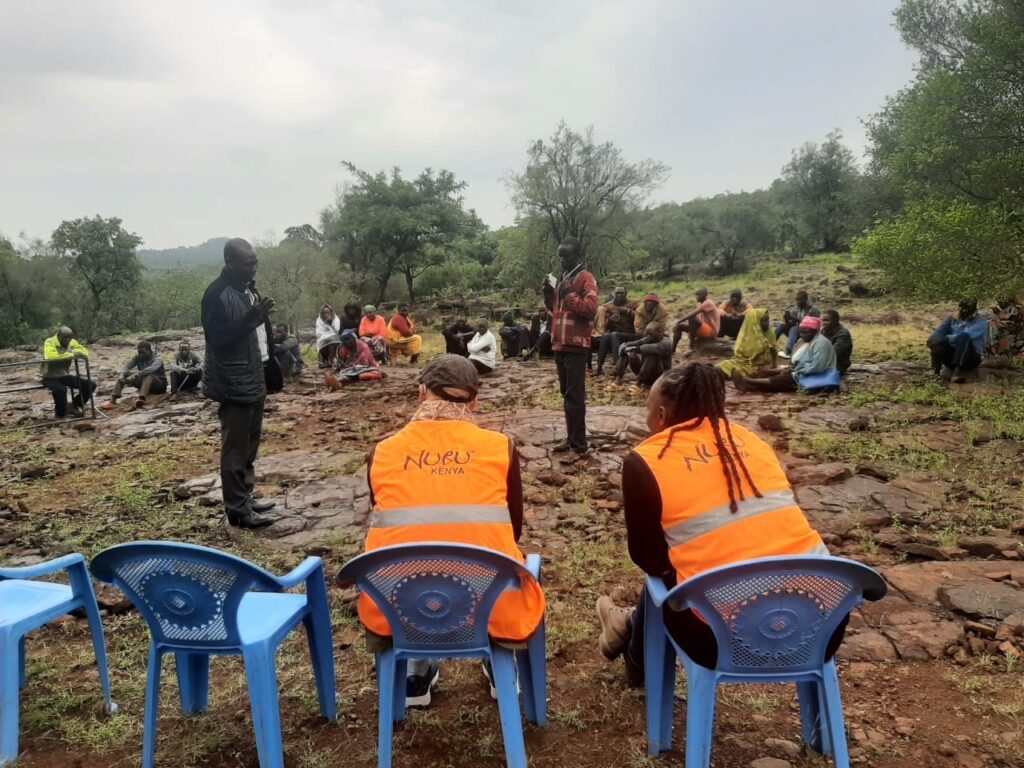
Meeting with farmers and community leaders in Baringo County, 2024
Baringo County is home to agricultural farmers as well as pastoralists (nomadic people raising sheep, goats and cattle). Advancing rural livelihoods, like farming and agro-pastoralism, is challenging in this environment, and residents have faced low crop yields, loss of livestock, extreme food insecurity, and famine. With limited viable land and sparse resources, historic cattle rustling practices have escalated into regular violent clashes between different pastoralist communities and are now impacting sedentary farming communities. The once isolated incidents have become commonplace in Baringo County in 2024, stymying economic growth and contributing to increased instability (Reliefweb).
Nuru Kenya’s Work in Baringo County
Agribusinesses and Markets
In 2022, Nuru Kenya began work in Baringo County by identifying and registering rural farmer cooperatives. The organization is now working with 28 early-stage rural cooperatives with the vision of supporting these cooperatives to transition to profitable and professional agribusinesses. They are currently receiving leadership and governance support through capacity strengthening provided through ongoing training and resources from Nuru Kenya. Nuru Kenya intends to strengthen these farmer-owned cooperatives, equipping them to become agribusinesses that achieve a level of professionalism and profitability to stand on their own and continue to provide support to their farmer members.
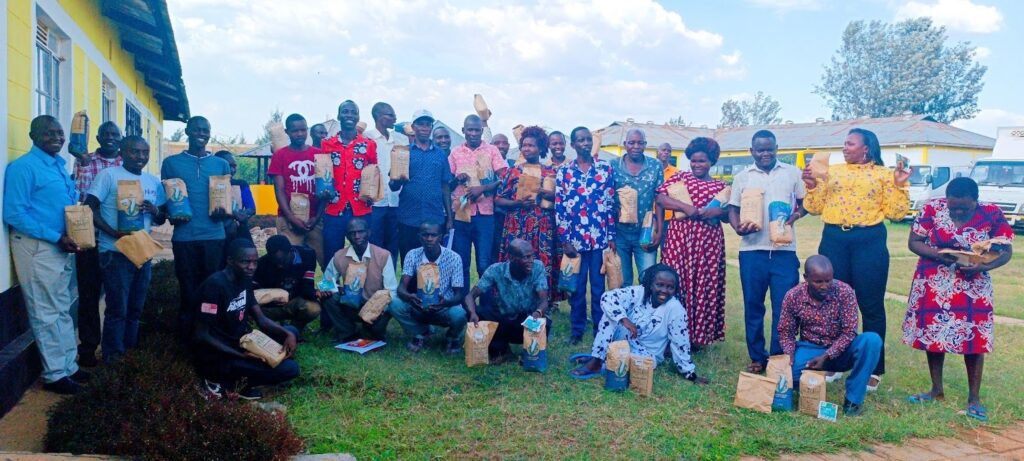
Baringo County cooperative leaders’ training, 2024
Nuru Kenya is also focused on strengthening regional networks and supply chains to support improved access to technology, inputs, and finance that will benefit additional cooperative agribusinesses in nearby counties. By investing in the strengthening of cooperative agribusinesses with robust market linkages in rural areas, Nuru enables rural entrepreneurs to work together to chart a lasting path out of extreme poverty and build a growing network of locally-owned and locally-led cooperative agribusinesses that are responsive to evolving community needs. When farmers and pastoralists begin to work together within businesses and across value chains, they are incentivized to limit violence and strengthen social cohesion to achieve shared economic prosperity.
Taking Stock of the First Two Years
During these last two years, Nuru Kenya has trained agribusiness leaders on climate-smart agriculture and established market linkages for access to drought-tolerant seeds for food crops and fodder. Nuru Kenya intends to offer additional training packages as the cooperatives grow and expand their operations. Nuru Kenya is eager to support these rural entrepreneurs to increase their productivity in the variety of rural livelihoods they engage in, including beekeeping, agricultural crops, and dairy.
Historically, in Migori County, where Nuru Kenya began operations, farmers required input loans at the early stages to facilitate production activities and accelerate development of their agribusinesses. With a focus on sustainability, Nuru Kenya Managing Director Pauline Wambeti and her team are equipping rural cooperatives in Baringo County to purchase quality farming inputs. As cooperatives make these purchases, their members are able to access these inputs affordably and in a timely manner. “When farmers are informed and linked [to markets], they can take up the challenge themselves,” Pauline shares. As Nuru Kenya’s model intentionally builds toward agribusinesses that are self-sustainable, member engagement and an invested sense of ownership are critical.
When Nuru Kenya first began working with local leaders in the communities, there was a growing belief in the county that seasonal crops could no longer grow in certain areas based on year after year of failed harvests. Leveraging their long-standing relationships with quality seed companies, Nuru Kenya has used demonstration plots to show farmers that strong harvests are possible in the face of extreme weather. A renewed sense of hope within the supported agribusinesses and surrounding communities is palpable. As Pauline noted, hope is being converted into action through the demand and purchase of climate-smart seed varieties.
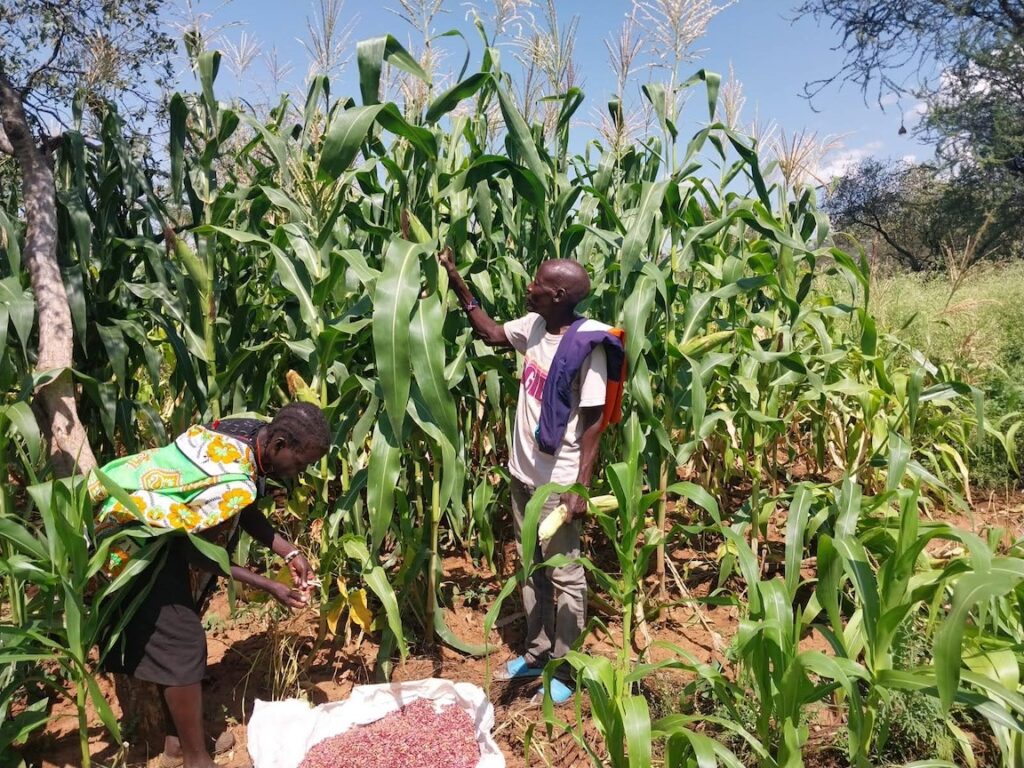
Cooperative leaders inspect corn and bean harvests, Baringo County, 2024
In addition to equipping agribusinesses with the resources necessary to see increased crop yields, Nuru Kenya has been working on reforestation efforts with the Kenya Forestry Research Institute (KEFRI). As the population grows, demand for timber and charcoal increases, and farmers compete with pastoralists for less and less productive land. This leads to increasing deforestation of the acacia landscapes in Baringo County, threatening the stability and safety of the entire region. To address this, Nuru Kenya envisions delivering livelihood diversification opportunities to pastoralists and farmers–opportunities that will mitigate the impact on the local environment and soil by increasing non-timber forestry productivity (e.g., honey, fruit trees, etc) and increase the fodder available for grazing animals during dry seasons.
Baringo County: The Future
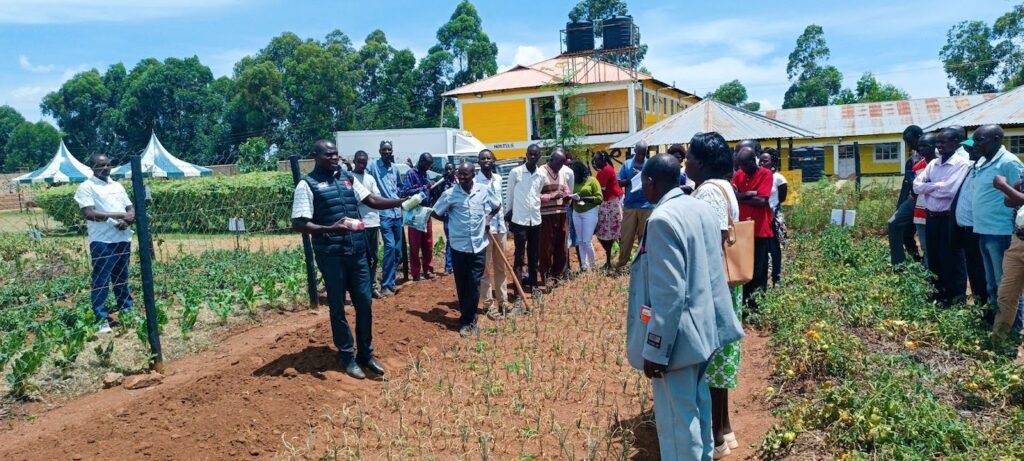
Training Baringo County cooperative leaders, 2024
Despite the compounding impacts of climate change, extreme poverty, and conflict, Pauline Wambeti and the Nuru Kenya team see hope in Baringo County. Farmers have demonstrated a willingness to work together in cooperative agribusinesses, and they have increased the demand for alternative livelihoods once thought fruitless. These early-stage impacts will act as a foundation for the next stages of Nuru Kenya’s intervention in Baringo County: to bring lasting community-led change to this semi-arid region. To achieve this goal, Nuru Kenya will support farmer agribusinesses in Baringo County over the next five to seven years, equipping these agribusinesses to grow in their maturity, build market linkages, and deliver impact to their farmer members. Though the road ahead will be filled with challenges for the rural population in Baringo County, these determined agribusinesses will be equipped to create opportunities for sustainable livelihoods, climate resilience, and economic prosperity throughout Baringo County.
Baringo County Baseline Report
The 2024 Baringo County Baseline Report is available as of November 2024. The vision for Baringo County is a thriving, self-sustaining community where empowered cooperatives and resourceful households collaborate to achieve shared goals. With a commitment to learning, adapting, and making an impact, Nuru Kenya is well-positioned to support real and lasting change for the families and communities it serves. As Nuru Kenya looks to the future, its focus remains on creating sustainable opportunities for economic growth and building resilience within Baringo County’s communities. This baseline report provides a clear picture of the strengths and challenges smallholder farmers face across dairy, meat, beekeeping, and shoat value chains. The data highlights areas where targeted support can make a significant difference, particularly in raising incomes, strengthening cooperative structures, and adapting to climate challenges in the region.


